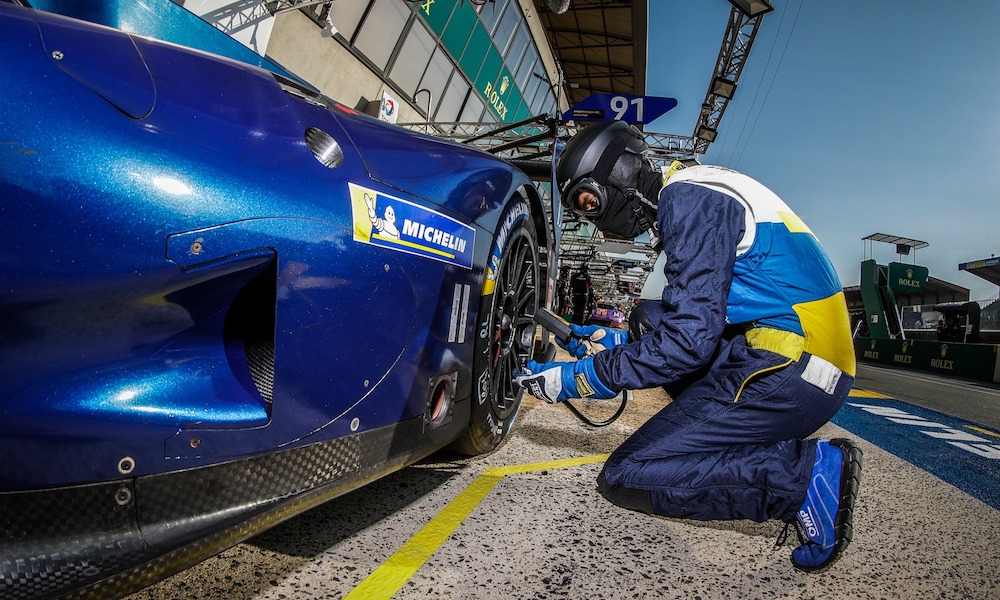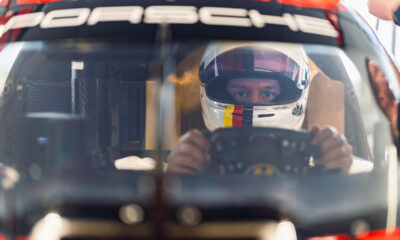
Photo: Michelin Motorsport
Michelin has needed to overcome a host of challenges including on-site personnel shortages and slick tire supply concerns to guarantee effective operation at the 24 Hours of Le Mans, according to the company’s global motorsport director Matthieu Bonardel.
Michelin is supplying tires to a company record 54 cars out of the 59 entered into this weekend’s endurance classic, including all competitors in LMP1, GTE-Pro and GTE-Am.
Bonardel told Sportscar365 that a combination of this large number and the impacts of the coronavirus pandemic has made for a “really different” situation requiring several major changes to Michelin’s typical practices.
“The major thing for us is that we have more cars than ever in Le Mans history, which sets the tone of how big a challenge it would be, even if we didn’t have [the coronavirus pandemic],” said Bonardel.
“We have 54 cars, which really was a huge nightmare for us [when] in March we shut down our factory.
“We shut it for two months because in mid or late May there was nobody at the WEC or Moto GP or anywhere, who could commit to any race happening this year.”
When global motorsport started to return in June, Michelin sprung into action to prepare tires for its FIA World Endurance Championship entries at short notice.
“Luckily with the Sebring cancellation we got the tires back from that, fresh to use,” Bonardel explained.
“But to be honest, we were quite happy that we had some rain at Spa because it helped us a lot with the slick quantity. We didn’t have any capacity left over to produce Le Mans tires.
“Two weeks earlier would not have been possible, to put it into perspective.”
Michelin’s next major challenge was the allocation of personnel at Le Mans after travel restrictions prevented its teams from North America, Japan and elsewhere from traveling to France as normal.
Bonardel explained that this left Michelin around 20 people short for the 35 race teams it is working with.
The shortage led to the company trying to draft in people from its World Rally Championship and MotoGP programs, but both series are also holding events this week.
According to Bonardel, that left Michelin with “simply no option” but to recruit volunteers to work with its Le Mans teams.
“All the Michelin teams gather once a year at Le Mans to provide support to all these teams, but then this was cut off,” he said.
“Volunteers were needed at Michelin. So many people are enthusiastic to just do Le Mans. We train them just like we do for temporary people.
“That doesn’t make them full tire experts because it takes more than that. But what we want is them to do the basics: making sure there is air in the tire, taking comments from the drivers and so on.
“And if they need assistance, we have a level of assistance engineers who they can call and they will come. We are creating that second layer and it’s very organized like that.
“Right now I have people with some teams [who] don’t know a thing about the race. They’re going to learn through the race which is quite a challenge.
“But we’ve trained them enough so we are confident, 99 percent sure it should work. We are mitigating the main risks and addressing the issues, which I’m confident for the race.
“We are taking a risk, but what other solutions did we have? None. The other solution was to leave the teams with no assistance, giving them a stack of tires and saying ‘good luck’. We cannot do that. So we found a way to do it, which to us is acceptable.”
Adapting to a New Environment
The challenges have also extended to Michelin’s operations on-site, where strict COVID-19 protocols from the event organizers have impacted the tire manufacturer’s usual way of working.
The impacts have been felt throughout the operation, from communication between the paddock and Michelin’s engineers working with teams on pit lane, to ensuring the same level of support can be maintained in the event of a positive COVID-19 test.
The latter point has been particularly important for Michelin’s team of tire fitters who are based in the company’s compound at the rear of the Le Mans paddock.
“If one fitter starts to be considered and found positive [it affects] the whole population of 50 fitters,” said Bonardel.
“Who is going to fit tires? Should we ask Goodyear for help? They have a small team but are they going to be able to fit 54 cars? No. It’s very critical.
“We identified that early and said these guys are very precious and we need to protect them. We have completely isolated them from the rest of the group, including me.”
Within the 50-strong band of tire fitters Michelin has implemented distinct working clusters to ensure that if one person falls ill, the fitting station can continue to operate.
“We created sub-clusters to protect the structure where we say it’s the most critical in terms of impact,” added Bonardel. “And some other places where we actually lighten the protocol.”
Michelin is also using a remote Le Mans “war room” for the first time, with a team of data analysts set up to follow the race from the company headquarters in Clermont-Ferrand.
“We have created a war room which is going to be active 24-hours [a day],” Bonardel explained.
“We have about ten people there who are going to be there in support, exchanging and analyzing data that is being collected here.
“It’s a little bit what has been done already by some teams in some championships with ‘ghost’ teams. We have never done that [before]. Normally all the people are on-site.
“But now we will use that remote team, simply because there was no value to be here in terms of getting better information or creating more risk of contaminating other people in our community.”
Bonardel added that despite the hurdles it has needed to manage at Le Mans, Michelin is confident of a smooth operation during the 24-hour race.
“It’s pretty much different [to normal] when you consider all those things,” he said.
“But after that it’s not going to be different in terms of messages and images: for us, not replacing a tire is better than keeping it. Our philosophy hasn’t changed.”

























